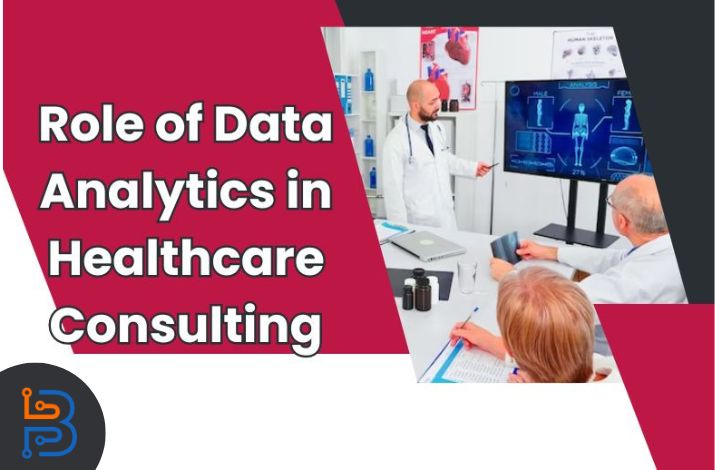The Role of Data Analytics in Healthcare Consulting

The use of data analytics has emerged as a game-changer in multiple industries that has the ability to reshape the future. It also plays a crucial role in the consulting industry and in improving the way they interact with patients’ data. By integrating data analytics into the healthcare consulting field, experts can enhance patients’ results and also optimize their processes. Moreover, it has the capacity to empower specialists to implement techniques to enact consequential improvements to their consulting language.
In this article, we will tell you about the role of data analytics in healthcare consulting.
What is Data Analytics?
Data analytics is analyzing raw data to extract significant insights and identify patterns, trends, and information. These gathered sets of data can be used to make informed decisions or implement strategies. It includes multiple strategies applied to huge datasets to find hidden patterns, relationships, or anomalies that would otherwise continue to be undetected.
Role of Data Analytics in Healthcare Consulting
Healthcare consultants can revolutionize the way they are consulting and recommending medicines to their patients by integrating data analytics. Here, you will get to know some practical examples of how data analytics impacts healthcare consulting:
- Harnessing Data for Informed Decision-making
- Enhancing Operational Efficiency
- Improving Patient Outcomes
- Facilitating Strategic Planning and Innovation
- Navigating Regulatory Compliance and Risk Management
- Decision Support Analyst
- Healthcare Business Intelligence Consultant
- Healthcare Fraud Investigator
Harnessing Data for Informed Decision-making
Firstly, healthcare consulting relies heavily on informed decision-making to address multifaceted patient issues. Data analytics serves as the cornerstone of this process by providing insights that operate from a vast pool of information. Consultants leverage various data sources—from electronic health records and patient demographics to clinical trials and operational statistics—to drive actionable insights. Analyzing this data enables consultants to identify trends, forecast demand, optimize resource allocation, and evaluate the performance of healthcare systems.
Enhancing Operational Efficiency
The consultant’s performance is paramount in healthcare systems, and data analytics plays a pivotal component in streamlining operations. Consultants use analytics to discover bottlenecks, inefficiencies, and areas ripe for development within the healthcare field. Using predictive modelling and machine learning algorithms, specialists can forecast affected person volumes, allocate resources correctly, and optimize team of workers scheduling. Moreover, these technologies help them lessen wait times, in the end improving the general affected person’s experience for their delight and proper recovery.

Improving Patient Outcomes
The ultimate purpose of any healthcare structure is to boost patient development for their reputations and set up a positive image. Data analytics empowers experts to delve into affected patients’ records, enabling them to provide customized and unique care to them. By analyzing affected patients’ histories and remedying effects, consultants might also increase tailored treatment plans, expect health risks, and advise interventions.
Facilitating Strategic Planning and Innovation
Data analytics serves as a compass for strategically making plans and fostering innovation in the healthcare consulting field to offer a satisfactory experience to patients. They are also able to leverage data-driven insights to plot long-term strategies that align with enterprise traits and technological advancements. Moreover, analytics helps identify emerging healthcare technology, allowing experts to recommend modern solutions that improve patient care and operational efficiency. By doing so, they will have the potential to provide patients with an excellent experience and establish a positive clinic image.
Navigating Regulatory Compliance and Risk Management
Compliance and risk control are crucial in an enterprise as heavily regulated as healthcare, and this completely relies on them. Data analytics assists consultants in navigating complicated regulatory landscapes by ensuring adherence to recommendations and protocols to offer assistance. Furthermore, it facilitates the finding of risks, like cybersecurity threats or regulatory non-compliance, enabling proactive mitigation strategies. In this way, consultants may navigate compliance and risk management for effective and practical outcomes for patients.
Decision Support Analyst
The collaboration of data analytics provides consultants with data-driven insights to guide strategic decisions in the healthcare field for patients. Moreover, they are also free to create models, reports, and visualizations that assist them in identifying opportunities for improvements. In this way, the collaboration between these fields allows consultants to make informed decisions regarding clients’ interventions and policies.
Healthcare Business Intelligence Consultant
Healthcare business intelligence consultants are experts in the field of healthcare and business. As a result, these professionals or experts interpret data to create actionable business intelligence. Furthermore, they assist healthcare consulting firms in making informed decisions by providing insights into market trends. Also, a collaboration of these fields in healthcare will deliver insights like patient behavior, and competitive analysis to consultants.
Healthcare Fraud Investigator
In this world of technologies, as tech gadgets are evolving, the fraudulent components also developing themselves with technologies. Working within healthcare consulting, fraud investigators utilize data analytics to detect and prevent fraudulent activities in billing and insurance claims. They are essential to prevent clinics from fraud, but they are also necessary for healthcare transactions. Their roles help safeguard against financial losses and ensure regulatory compliance to provide better outcomes.
Challenges and the Path Forward
Despite its significant capability, incorporating data analytics into healthcare consulting poses challenges. These challenges include information privacy concerns, interoperability problems, the need for skilled data professionals, and the moral use of patient data. Overcoming these issues calls for collaborative efforts between specialists, healthcare corporations, and regulatory bodies to set up sturdy data governance and privacy. Moreover, they will be able to make prevented and safe security frameworks for their consulting tasks.
As we move forward, the function of data analytics in healthcare consulting will continue to evolve. Integrating advanced technologies like artificial intelligence, predictive analytics, and machine learning will further revolutionize the way consultants leverage data to drive impactful modifications within the healthcare terrain.
Final Verdict
Data analytics is no longer a choice but a necessity in healthcare consulting for the present world of healthcare consulting. It has the potential to find actionable insights, improve operational efficiency, improve patient development, and enhance innovation. These abilities solidify their integral role in shaping the future of healthcare consulting. Ultimately, this process leads to more efficient, effective, and patient-centric healthcare systems.






